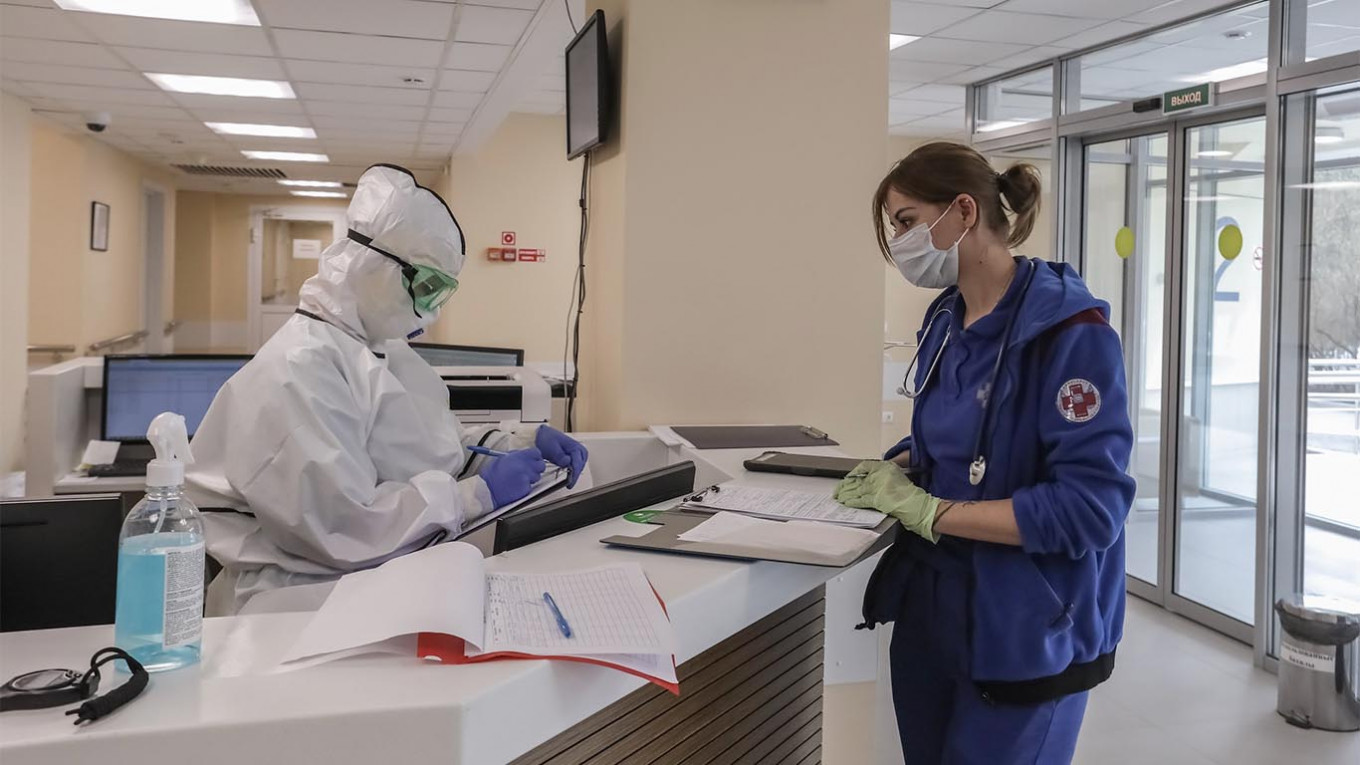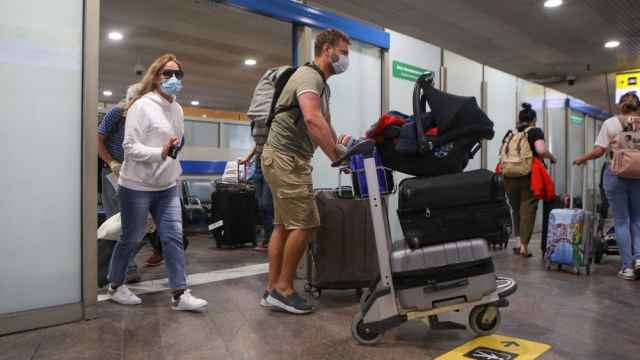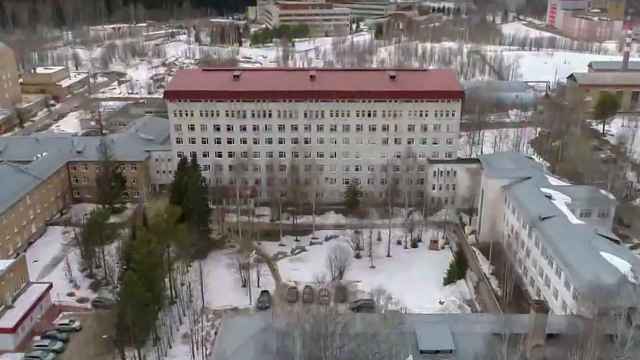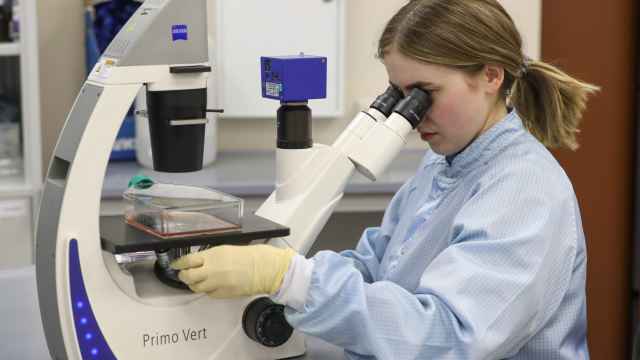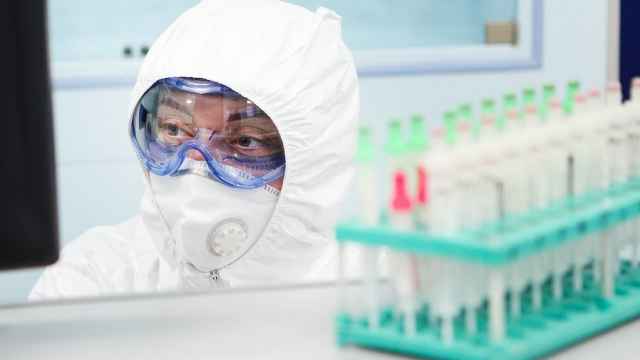Russia’s private hospitals are playing a limited role in treating Covid-19 patients as insufficient government funding and an outdated insurance system are making it difficult for them to switch to specialist treatment.
With Russia’s official tally of coronavirus infections over 230,000 on Tuesday, the country is scrambling to find extra hospital beds to deal with the pandemic. Despite official reassurances that the health system can cope, in Moscow and the surrounding region — where more than half the country’s cases are located — reports from medical professionals on the ground paint a picture of a system rapidly approaching breaking point, with reports of ambulances driving for hours to find a hospital with a free bed, and queueing up outside.
To deal with the squeeze, Russia has embarked on a huge mobilization drive to get as many hospital beds as possible ready to treat Covid-19 patients. Moscow has already built an emergency hospital on its outskirts, and is currently converting exhibition space in the VDNKh park into another huge temporary hospital.
Outside the capital, the Russian government has handed down quotas to hospitals dictating how many extra beds they must provide to deal with Covid-19 patients. In many places, the search for space has taken a creative turn. A hospital in Kurgan, in the Urals, is reprofiling its hospital museum — complete with archaic surgical tools and dummy skeletons — into the frontline of its battle with the virus.
While private hospitals in many European countries have been enlisted to treat Covid-19 patients, in Russia they’re playing a limited role as private players lack the facilities necessary to treat the coronavirus, and low-key support from the government makes reprofiling financially pointless.
“Private clinics’ input is real, but it should not be overestimated,” said Vasiliy Vlassov, an epidemiologist at Moscow’s Higher School of Economics. “Most are cherry picking as they don’t want to provide all necessary care. Private clinics want to participate, but only a small number can, because they are not orientated to such resource-intensive treatments.”
While private players have played an extensive role in Russia’s testing regime, just three fully private healthcare providers — Medsi, K-31 and Mother and Child — have converted hospitals in Moscow to accept Covid-19 patients. In total, they have added around 825 beds, official data shows. More than half of those are occupied by paying customers.
Factoring in extra beds converted at RZD Medicine hospitals — a quasi-market player providing healthcare for the staff of state-owned Russian Railways but also offering private corporate healthcare — around 5% of Moscow’s 30,000 Covid-19 beds have been requisitioned from outside the nationalized healthcare system.
Unprofitable
Private healthcare is a small part of the market in Russia — accounting for 15% of total healthcare expenditure. This is skewed towards non-emergency treatments, such as dentistry, cosmetics or maternity.
Even in Moscow there are only a handful of large sophisticated private hospitals which could in theory treat Covid-19, and even fewer with enough space or multiple premises to convert a facility, isolate Covid-19 patients and continue to work with regular patients. On top of this, the interplay between Russia’s public and private healthcare systems does not incentivize expensive reprofiling.
All Russians have access to free healthcare under a compulsory insurance system funded by the government, according to which private hospitals can be reimbursed if they take patients who don’t pay for themselves.
However, in the context of the coronavirus, the system appears to have fallen short. The tariff which has been set for city hospitals — 200,000 rubles ($2,720) for a course of Covid-19 treatment — appears counterproductively low. Moreover, there are no additional funds being provided for the costly task of actually reprofiling a hospital, moving patients, creating clean and dirty zones and, in some cases, reorienting building ventilation.
“The tariff is very unprofitable for us,” Yelena Brusilova, President of Medsi, which has converted its flagship hospital at Otradnoye in north Moscow, told Business FM. “Of course, we understand this is a loss for us.”
Coronavirus is an expensive disease to treat. At the Lapino hospital in Moscow’s exclusive Rublyovka suburb — a specialized facility of the Mother and Child private hospital and clinic network which usually focuses on maternal health and has now been fully converted to accept Covid-19 patients — around three medical staff are needed for each patient in order to provide round-the-clock care.
Accordingly, prices in the private sector start significantly higher than the tariff, with the cheapest hospitals requiring an upfront deposit of at least 300,000 rubles ($4,080). Each 24-hour stay can cost up to 40,000 rubles ($540) — a rate which almost triples for those who need intensive care.
Reprofiling also means retraining doctors — a task which might be especially complicated at private facilities, said Judy Twigg, a professor at Virginia Commonwealth University who specializes in Russia’s healthcare system.
She said private clinics and hospitals in Moscow have little experience with respiratory illnesses.
“They might be a little more agile than some of the public facilities, because they have more money and so they’re better staffed and better equipped, but the kinds of things they are used to treating lead you to ask: When’s the last time they had to put on full protective gear for an infectious disease? Probably never for a lot of these places.”
Getting medical staff up to speed on procedures surrounding personal protective equipment (PPE), and how to work in dirty and clean zones was one of the biggest challenges of the reprofiling mission, Medsi’s operational director Rodion Stupin said.
“At the start, we didn’t have enough doctors who were specialized in this concrete field, because this is a multifunctional hospital, and a big part of it is maternity,” said a Mother and Child spokesperson. “Our doctors had to go through a special course organized by the health ministry designed to treat Covid-19 patients.”
These kinds of costs and challenges mean it is only the very largest providers who have the resources to even consider reprofiling, said Victoria Samsonova, head of healthcare and pharma at KPMG in Russia, adding that the nature of the pandemic means they are also suffering financially as non-emergency medical treatments are cancelled.
Aside from RZD, Medsi is the only one of the private providers in Moscow taking in more than half its patients on state insurance. At the end of April, state-owned Otkritie bank awarded a 100 million ruble ($1.4 million) grant to Medsi to cover higher salaries for doctors working with Covid-19 patients.
Time for Modernization?
Russia’s state hospitals could also be missing an opportunity to use spare doctors and nurses from private facilities, Samsonova said. Given the downturn in cosmetic and non-urgent procedures, private healthcare providers “have large spare numbers of medical staff”, but they “cannot be immediately reprofiled.”
“In regions where the spread of infection is lower, there is no need for such a number of doctors. But repurposing some doctors or loaning them to state clinics is frustrated by regulatory restrictions. So we have this disbalance: the state hospitals lack human resources, and the private sector may have extra personnel who are not busy, but can’t be redirected immediately, because this takes time, money and regulatory compliance.”
These shortcomings in Russia’s response to the coronavirus have renewed calls for modernization of the system, in a way which could see private healthcare given a larger role. Russia’s Health Minister and the Audit Chamber are among those who have called for reforms in light of the pandemic.
“We are still dealing with a big legacy of the planned economy that we had in the Soviet Union,” said KPMG’s Samsonova, who agrees with modernization calls.
She adds: “Maybe the situation we have today will provide some significant incentives to modernize the system — something which is really needed.”
A Message from The Moscow Times:
Dear readers,
We are facing unprecedented challenges. Russia's Prosecutor General's Office has designated The Moscow Times as an "undesirable" organization, criminalizing our work and putting our staff at risk of prosecution. This follows our earlier unjust labeling as a "foreign agent."
These actions are direct attempts to silence independent journalism in Russia. The authorities claim our work "discredits the decisions of the Russian leadership." We see things differently: we strive to provide accurate, unbiased reporting on Russia.
We, the journalists of The Moscow Times, refuse to be silenced. But to continue our work, we need your help.
Your support, no matter how small, makes a world of difference. If you can, please support us monthly starting from just $2. It's quick to set up, and every contribution makes a significant impact.
By supporting The Moscow Times, you're defending open, independent journalism in the face of repression. Thank you for standing with us.
Remind me later.



